Related Research Articles
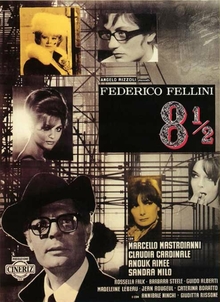
8+1⁄2 is a 1963 Italian surrealist psychological comedy-drama film directed and co-written by Federico Fellini. The metafictional narrative centers on Guido Anselmi,, a famous Italian film director who suffers from stifled creativity as he attempts to direct an epic science fiction film. Claudia Cardinale, Anouk Aimée, Sandra Milo, Rossella Falk, Barbara Steele, and Eddra Gale portray the various women in Guido's life. The film is shot in black and white by cinematographer Gianni Di Venanzo and features a score by Nino Rota, with costume and set designs by Piero Gherardi.
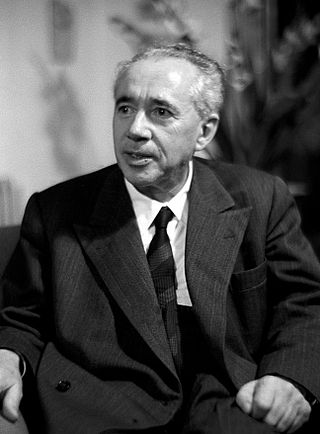
Giulio Natta was an Italian chemical engineer and Nobel laureate. He won a Nobel Prize in Chemistry in 1963 with Karl Ziegler for work on high polymers. He also received a Lomonosov Gold Medal in 1969.
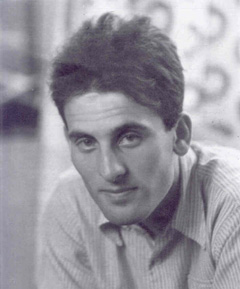
Giuseppe Paolo Stanislao "Beppo" Occhialini ForMemRS was an Italian physicist who contributed to the discovery of the pion or pi-meson decay in 1947 with César Lattes and Cecil Frank Powell, the latter winning the Nobel Prize in Physics for this work. At the time of this discovery, they were all working at the H. H. Wills Laboratory of the University of Bristol.
Guarino is an Italian name that is derived from the word guardia or guardiano meaning ‘to guard’ or ‘to protect’. The name refers to several notable people:

George Granville Sutherland-Leveson-Gower, 5th Duke of Sutherland, KT, PC, styled Earl Gower until 1892 and Marquess of Stafford between 1892 and 1913, was a British courtier, patron of the film industry and Conservative party politician from the Leveson-Gower family. He held minor office in the Conservative administration of Bonar Law and Stanley Baldwin in the 1920s and was later Lord Steward of the Household from 1935 to 1936. As a noted patron of the British film industry, the Sutherland Trophy, awarded by the British Film Institute, is named in his honour.

Eraclio Petri, commonly known as Elio Petri, was an Italian film and theatre director, screenwriter and film critic. The Museum of Modern Art described him as "one of the preeminent political and social satirists of 1960s and early 1970s Italian cinema". His film Investigation of a Citizen Above Suspicion won the 1971 Academy Award for Best Foreign-Language Film, and his subsequent film The Working Class Goes to Heaven received the Palme d'Or at the 1972 Cannes Film Festival.

Francesco Rosi was an Italian film director. His film The Mattei Affair won the Palme d'Or at the 1972 Cannes Film Festival. Rosi's films, especially those of the 1960s and 1970s, often appeared to have political messages. While the topics of his later films became less politically oriented and more angled toward literature, he continued to direct until 1997, his last film being the adaptation of Primo Levi's book, The Truce.
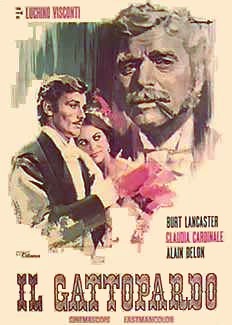
The Leopard is a 1963 epic historical drama film directed by Luchino Visconti. Written by Visconti, Suso Cecchi d'Amico, Enrico Medioli, Pasquale Festa Campanile, Massimo Franciosa, and an uncredited René Barjavel, the film is an adaptation of the 1958 novel of the same title by Giuseppe Tomasi di Lampedusa.

Carmine Gallone was an early Italian film director, screenwriter, and film producer, who was also controversial for his works of pro-Fascist propaganda and historical revisionism. Considered one of Italian cinema's leading early directors, he directed over 120 films in his fifty-year career between 1913 and 1963.
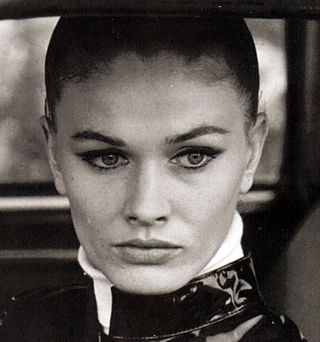
Ida Galli is an Italian film actress best known for her roles in spaghetti Western and giallo films in the 1960s and 1970s. Galli has appeared under several pseudonyms, including Arianna, Evelyn Stewart and Isli Oberon.

Giuseppe Volpi, 1st Count of Misurata was an Italian businessman and politician.

Harold Huth was a British actor, film director and producer.
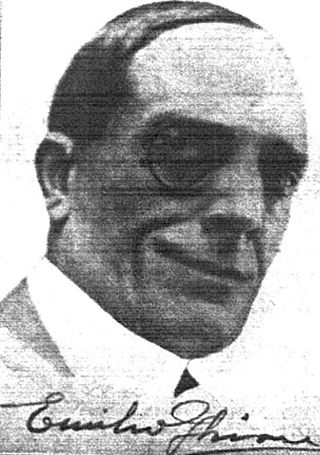
Emilio Luigi Carlo Giuseppe Maria Ghione, known as Emilio Ghione, was an Italian silent film actor, director and screenwriter. Ghione was best known for writing, directing, and starring in the Za La Mort series of adventure films, in which Ghione played a likeable French Apache and 'honest outlaw'. Ghione directed, wrote, and acted in every genre of film, and directed some of the most famous stars of the time, including Francesca Bertini, Lina Cavalieri, Alberto Collo, and Hesperia. After his final film role in 1926, Ghione briefly performed on a theatrical tour of Italy. Ghione wrote three novels based around his Za La Mort character, an autobiography, and an essay on Italian Silent Cinema, before his death from tuberculosis in 1930.
Downstream is a 1929 British crime film directed by Giuseppe Guarino and starring Chili Bouchier, Harold Huth and Marie Ault.
Lloyd Reckord was a Jamaican actor, film maker, and stage director who lived in England for some years. Reckord appeared in 1958 in a West End production of Hot Summer Night, which as an ITV adaptation broadcast on 1 February 1959 contained the earliest known example of an interracial kiss on television. His brother was the dramatist Barry Reckord.
Luciano Ercoli was an Italian film director, screenwriter, producer and unit production manager. Ercoli's career spanned approximately two decades before his retirement in the late 1970s, and saw him direct several films in the giallo genre, as well producing several Spaghetti Westerns. Ercoli was married to Spanish actress Nieves Navarro, who has appeared in several of the films he worked on.

Giuseppe Guarino was an Italian Roman Catholic prelate and cardinal who served as the Archbishop of Messina from 1875 until his death. He was also the founder of the Apostoli della Sacra Famiglia. Guarino dedicated himself to proper religious formation for both priests and nuns while serving in both Siracusa and Messina and was known for reigniting the faith in those who were considered cut off from the faith.
Giuseppe Guarino may refer to:

Giuseppe Guarino was an Italian law scholar and politician from the Christian Democracy (DC). He served as the minister of finance briefly in 1987 and minister of industry and minister of state holdings from 1992 and 1993.
References
- ↑ British Film Institute (12 February 1963). "Giuseppe Guarino | BFI | British Film Institute". Explore.bfi.org.uk. Archived from the original on 11 September 2012. Retrieved 8 January 2013.